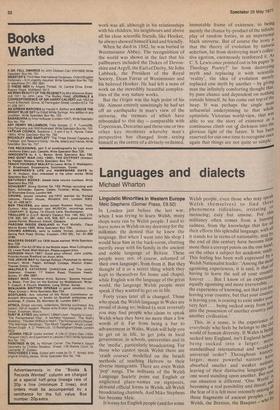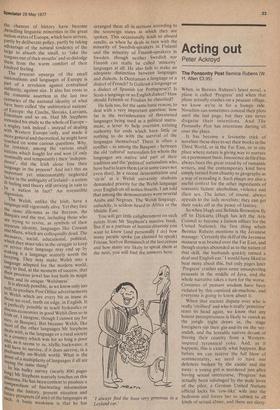Languages and dialects
Michael Wharton
Linguistic Minorities in Western Europe Meic Stephens (Gomer Press, £9.50)
In London just before the last war, when I was trying to learn Welsh, many shops were run by Welsh people. I used to leave notes in Welsh on my doorstep for the milkman. He denied that he knew the language. But when I went into his shop I would hear him in the back-room, chatting merrily away with his -family in the ancient and noble language of Britain. These people were not, of course, ashamed of their own language; from from it. But they thought of it as a secret thing which they kept to themselves for home and chapel, while English was the language of the great world, the language Welsh people must speak if they wanted to get on in life.
Forty years later all is changed. Those who speak the Welsh language in Wales are proud of doing so; indeed (a neat reversal) you may find people who claim to speak Welsh when they have no more than a few words of it. Far from being a bar to advancement in Wales, Welsh will help you to get on . in life, to get jobs in local government, in schools, universities and in the 'media', particularly broadcasting. For those who cannot speak Welsh there are 'crash courses' modelled on the Israeli methods of teaching Hebrew to their diverse immigrants. There are even Welsh 'pop' songs. The militants of the Welsh Language Society point out English or anglicised place-names on signposts, demand official forms in Welsh, all-Welsh broadcasting channels. And Mike Stephens has become Meic.
It is easy for English people (and for some
Welsh people, even those who may speak Welsh themselves) to find these phenomena ridiculous, irritating c:r menacing; easy but unwise. For this militancy often comes from a burnin sadness, from the knowledge that for all ; their efforts this splendid language, with L. it stands for in terms of nationality, may 11,1 the end of this century have become little more than a corrupt patois on the one Ilan' on the other a subject for academic studY' This feeling has been well expressed bY 3, Welsh Nationalist leader: 'Among the rn°si ago.nising experiences, it is said, is that ° having to leave the soil of your collo° forever . . . But I know of an experience equally agonising and more irreversible'' the experience of knowing, not that you are leaving your country, but that your countryt is leaving you, is ceasing to exist under very feet ... being sucked away from Y°43" into the possession of another country an
another civilisation.' of
This, in a sense, is the experience ,d everybody who feels he belongs to the °,I world of human diversity. If Wales is beirirf sucked into England, isn't England hersere being sucked into a larger, inlbe standardised international and wonlw universal order? Throughout hislory,t larger, more powerful nations 11°, absorbed smaller and weaker nati°E; leaving of their distinctive languages 00r 00 one word standing upon another. But iriv our situation is different. 'One World bc1 becoming a real possibility and threat; ail the fear of it is felt most intensely amatigt'he those fragments of ancient peoples by Welsh, the Bretons, the Basques — wh°
the chances of history have become dwindling linguistic minorities in the great nation-states of Europe, which have striven, Partly by deliberate policy, partly by taking a("vantage of the natural tendency of the large to absorb the small, to 'take the tongues out of their mouths' and so dislodge them from the warm comfort of their kindred feeling.
The present upsurge of the small nationalisms and languages of Europe is Part of a revulsion against centralised authority, against size. It also has roots in the romantic assertion in the last two centuries of the national identity of what have been called 'the unhistorical nations' of Europe: the Czechs, Slovaks, Latvians, Estonians and so on. Had Mr Stephens extended his study to the whole of Europe — a mighty task indeed — instead of dealing With Western Europe only, and made it more general and theoretical, he might have touched on some curious questions. Why, for instance, among the various small nations which fought for and won (if only nominally and temporarily) their 'independence, did the Irish alone lose their language in the process? And isn't this an important yet unaccountably neglected factor in the ambiguity of Ireland — a nation al feeling and theory still striving in vain to be a nation in fact? An irresistible digression. , The Welsh, unlike the Irish, have a language still vigorously alive. Yet they face the same dilemma as the Bretons, the l'aasques and the rest, including those who are trying to revive, as symbols of their separate identity, languages like Cornish and Manx, which are colloquially dead. The Measures, social, educational, political, Which they must take in the struggle to keep or revive their language may end up by iitaking it a language scarcely worth the (t eel:tin& They may make Welsh into a language adapted for the modern world, (MIY to find, at the moment of success, that their precious jewel has lost both its magic lustre and its unique 'Welshness'.
It is already possible, as we know only too
ell, to produce Post Office advertisements In Welsh which are every bit as inane as ,'nose we read, teeth on edge, in English. It IS Perfectly possible to teach hydraulics or discuss economics in good Welsh (less so in Isrish or, limagine, though I cannot say for ure, in Basque). But because Welsh, like Most of the other languages Mr Stephens a. eals with, is the language or a rural society M a country which was for so long a poor _and, as it seems to us, idyllic backwater, it Will have to survive, if it does survive, in a Profoundly un-Welsh world. What is the riclint of a multiplty of languages if all are saying the same thing? 10 In his bulky survey (nearly 800 pages ,;11, g) Mr Stephens scarcely touches on this compendium He has been content to produce a `°,1npendium of fascinating information
bout the history, present situation and s'IlltAire prospects (if any) of the languages as en A basic weakness is that he has arranged them all in sections according to the sovereign states in which they are spoken. This occasionally leads to absurd results, as when he deals in turn with the minority of Swedish-speakers in Finland and the minority of Finnish-speakers in Sweden, though neither Swedish nor Finnish can really be called 'minority' languages at all. He also fails to make an adequate distinction between languages and dialects. Is Occitanian a language or a dialect of French? Is Galician a language or a dialect of Spanish (or Portuguese)? Is Scots a language or an English dialect? How should Felmish or Friulian be classified?
He fails too, for the same basic reason, to deal with a very important question: how far is the recrudescence of threatened languages being used as a political instrument, a lever to help overturn existing authority for ends which have little or nothing to do with the survival of the languages themselves? There is often a conflict — as among the Basques — between the old 'cultural' nationalists for whom the languages are , native and part of their tradition and the 'political' nationalists who.
have had to learn them (or in some cases not even that). In a recent demonstration and 'sit-in' at a Welsh university students demanded priority for the Welsh language over English on all notice-boards. I am told that among the demonstrators were several Arabs and Negroes. The Welsh language, unluckily, is seldom heard in Africa or the Middle East.
You will get little enlightenment on such points from Mr Stephens's massive book. But if as a partisan of human diversity you want to know (and personally I do) how many people spoke (or claimed to speak) Frisian, Sorb or Romansch at the last census and how many are likely to speak them at the next, you will find the answers here.



































 Previous page
Previous page